Lecture 2
Class Survey Results vs. Professional Consensus
August 27, 2025
Class Survey Results
Concern: Air quality
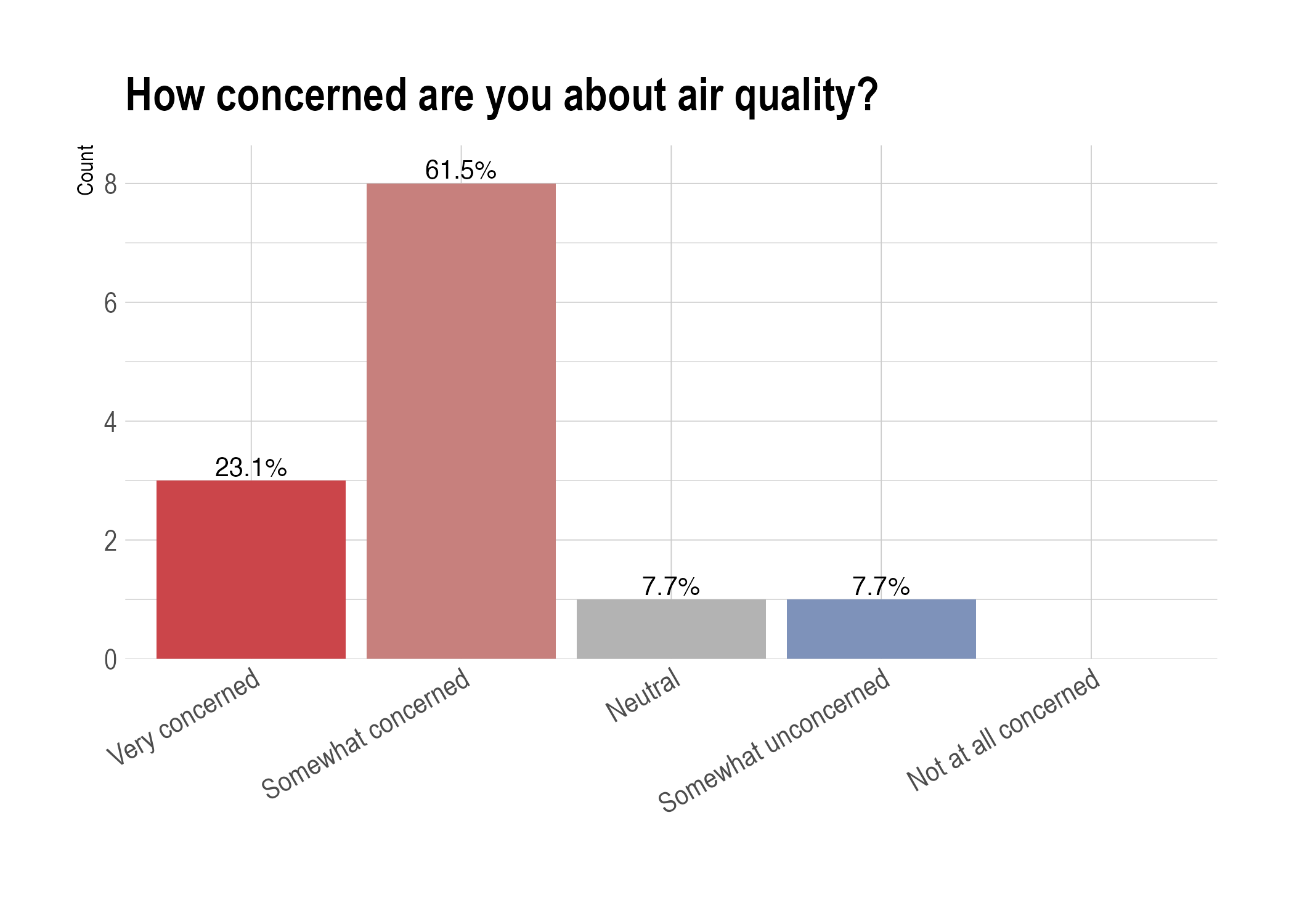
Economists: 57.14% concerned
Our class is 31% more concerned than professional economists.
Concern: Environmental justice
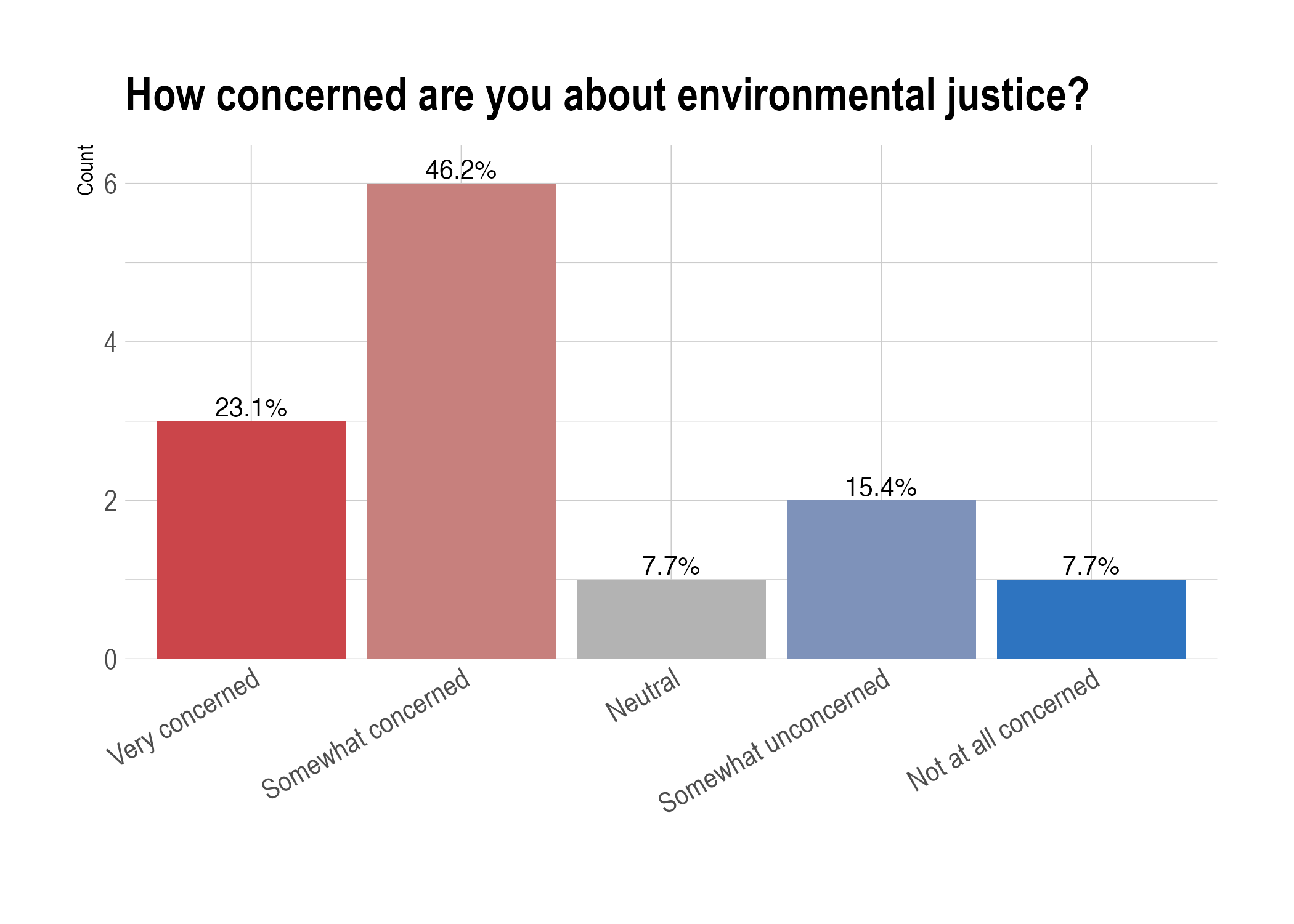
Economists: 53.97% concerned
Our class is 21% more concerned than professional economists.
Concern: Renewable energy
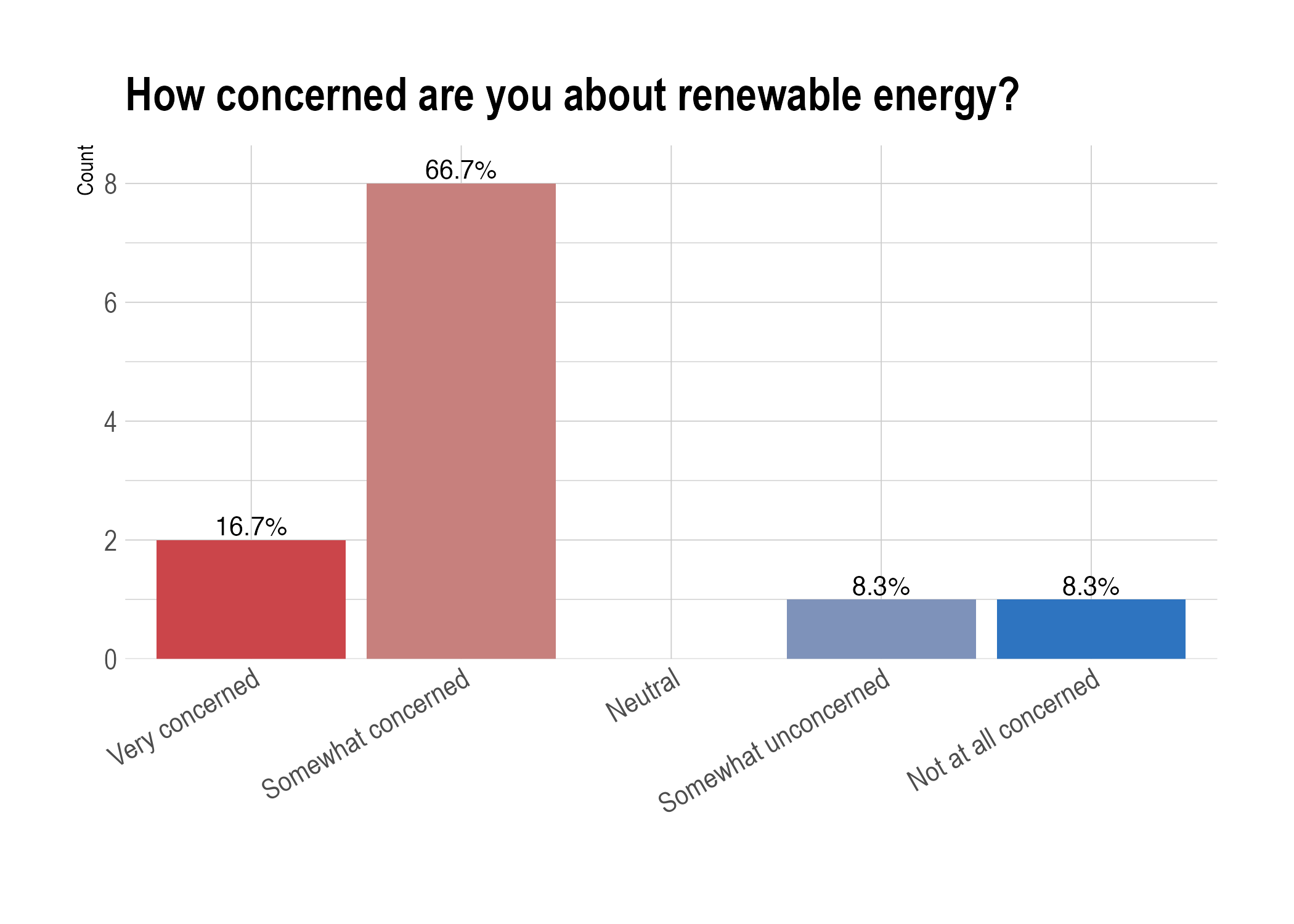
Economists: 45.21% concerned
Our class is 35% more concerned than professional economists.
Concern: Mining impacts
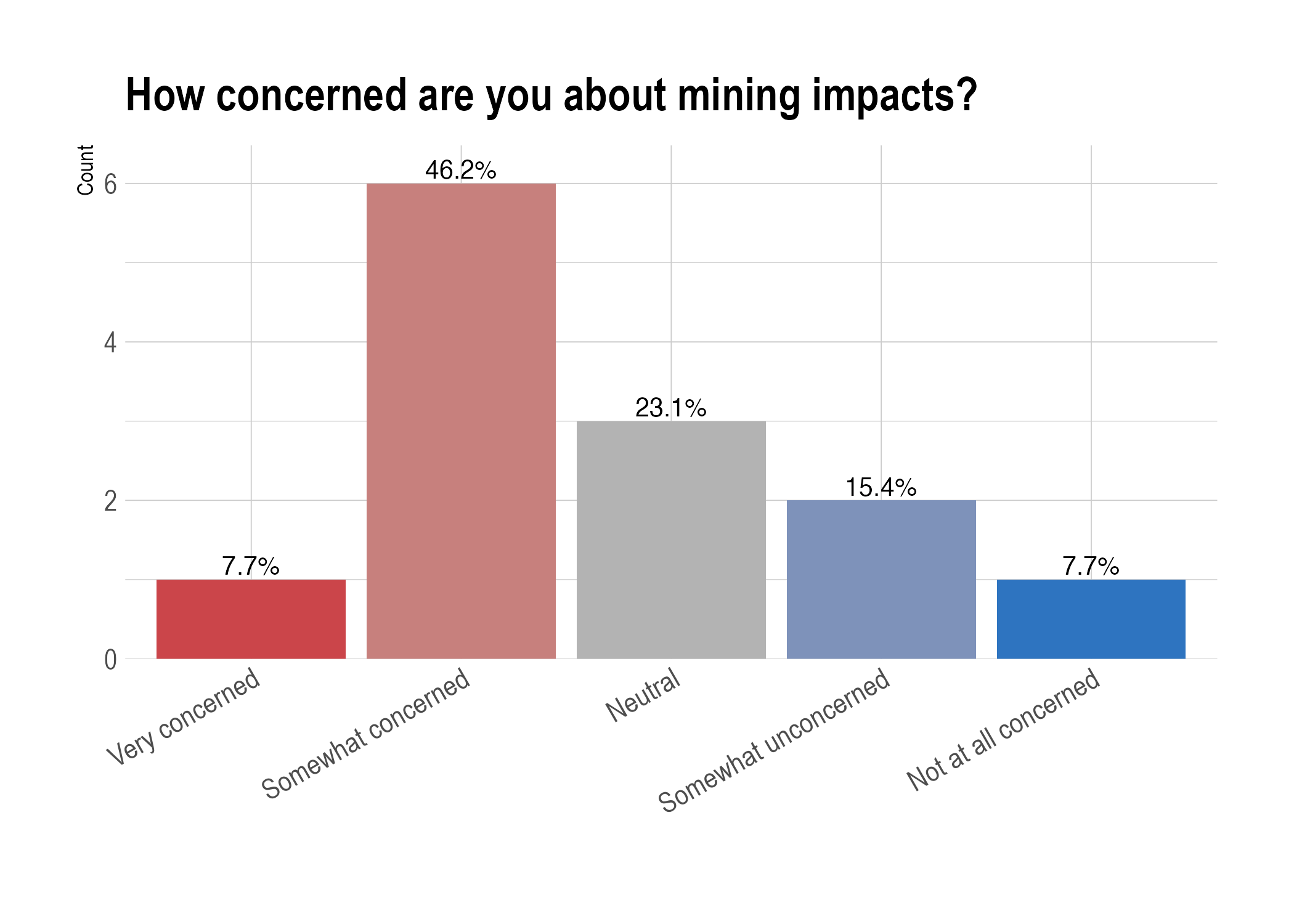
Economists: 40.64% concerned
Our class is 16% more concerned than professional economists.
Concern: Solid waste
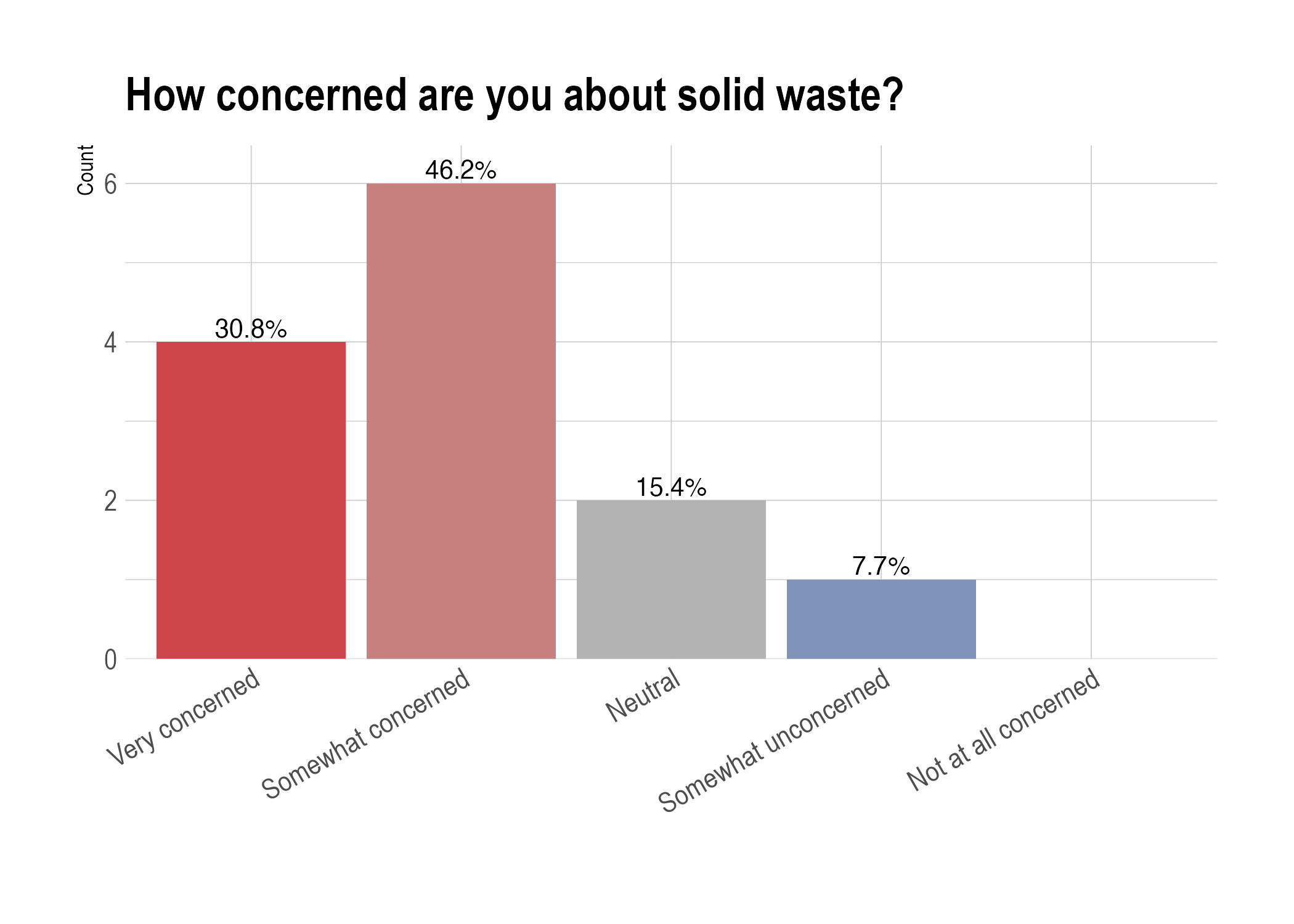
Economists: 39.46% unconcerned
Our class is 37% more concerned than professional economists.
Concern: Hazardous waste
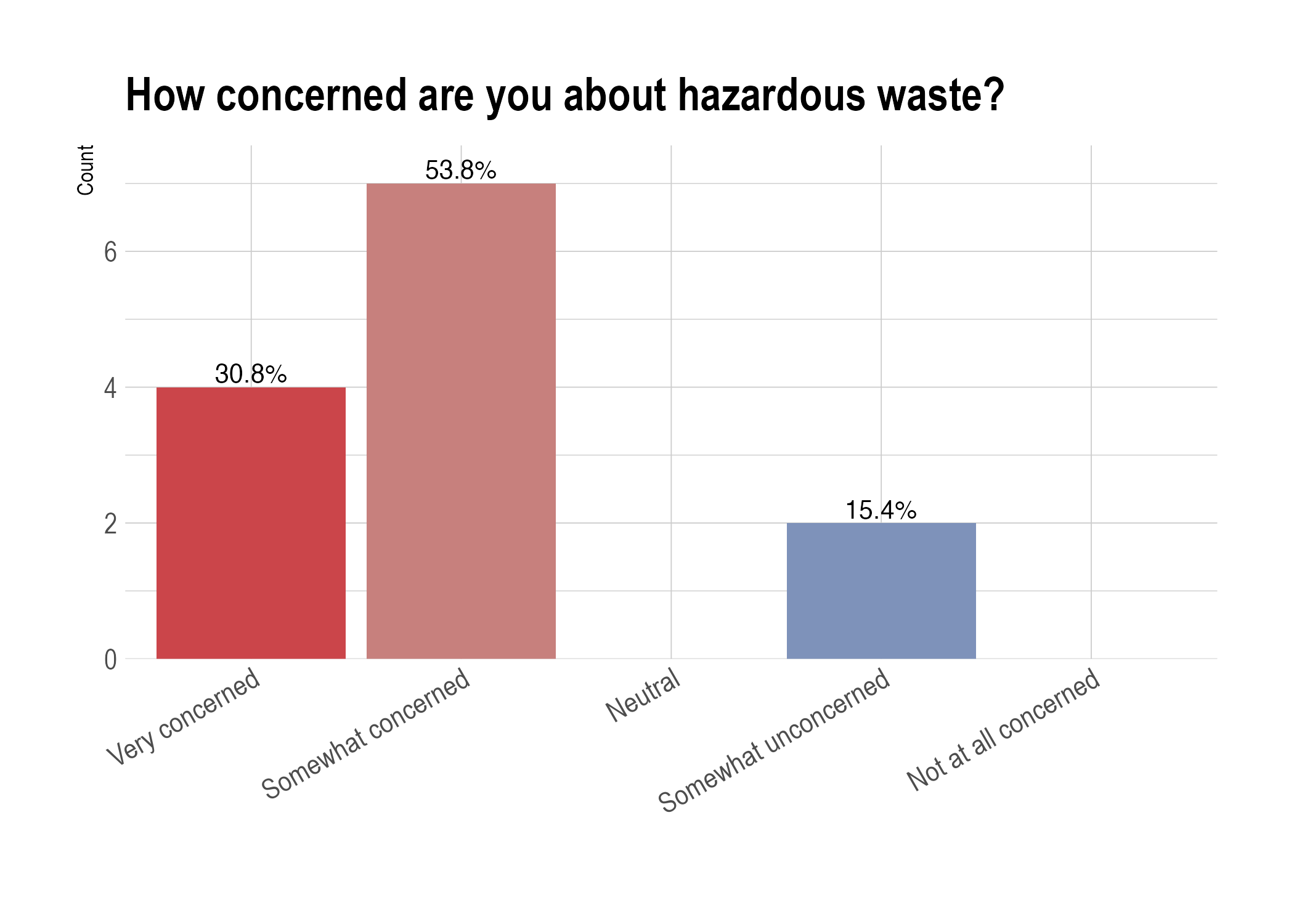
Economists: 38.38% neutral
Our class is 50% more concerned than professional economists.
Policy Support: Methane limits (natural gas production)
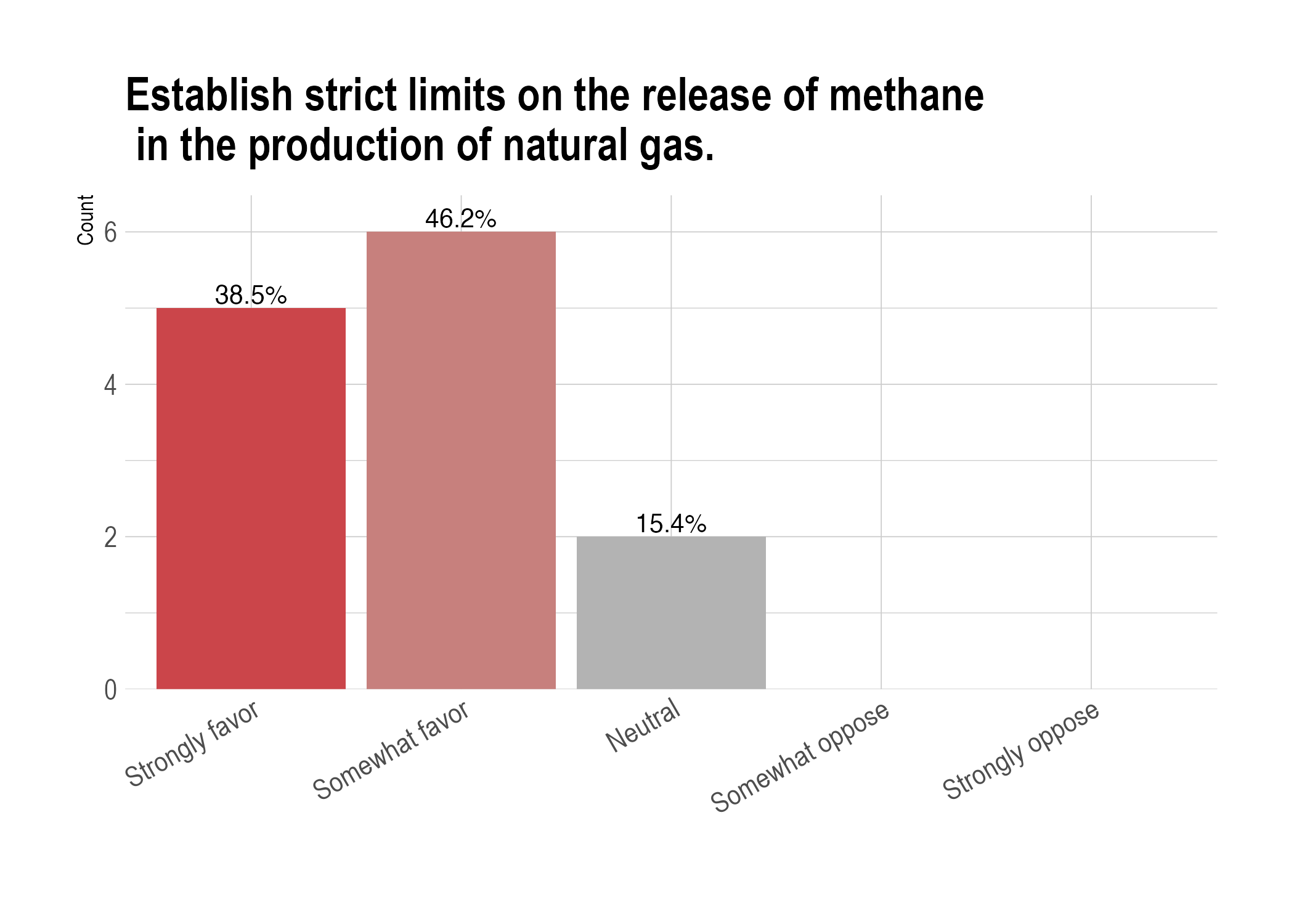
Economists: 75.39% favor
Our class is 7% more supportive than professional economists.
Policy Support: International agreements
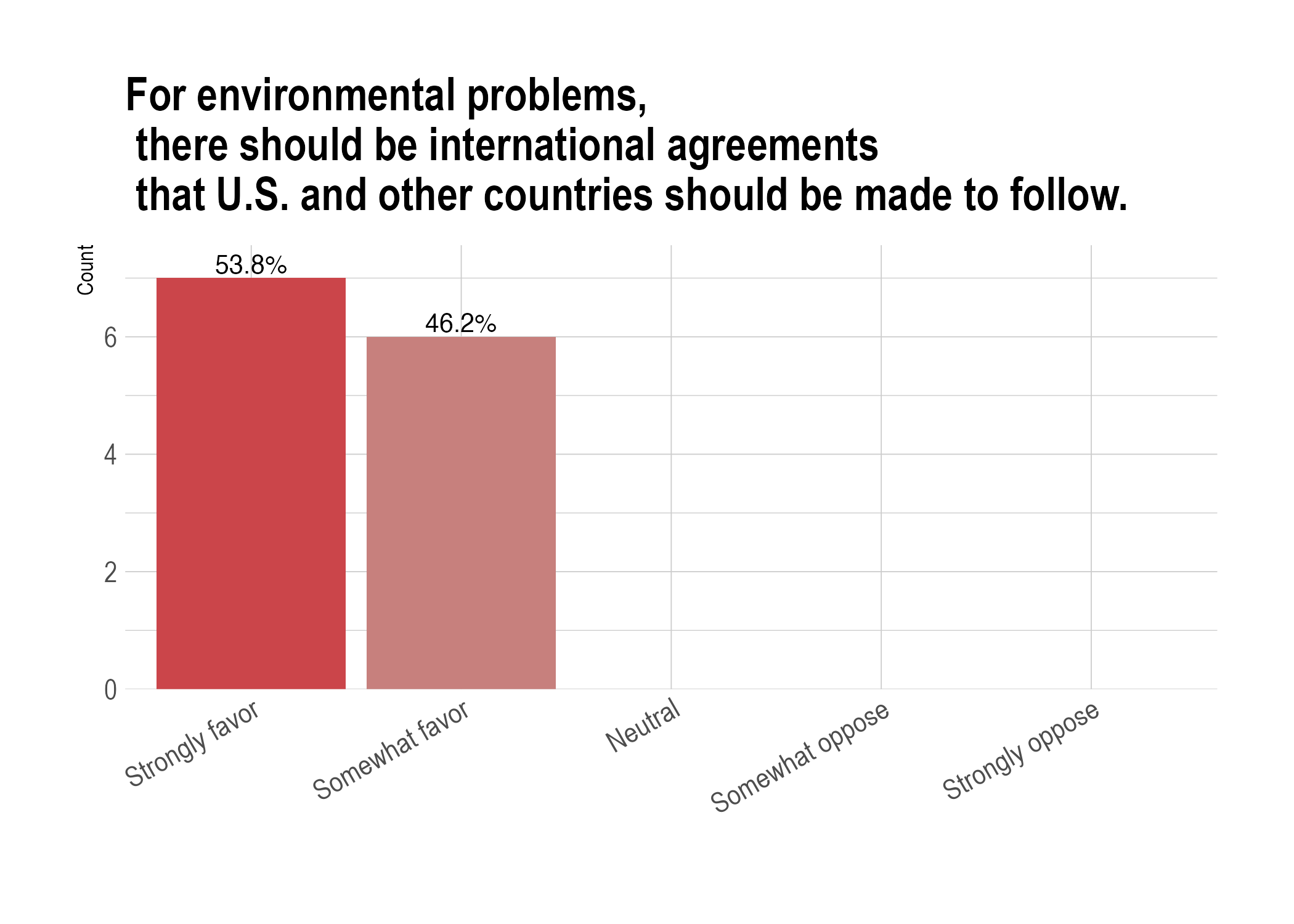
Economists: 74.35% favor
Our class is 26% more supportive than professional economists.
Policy Support: EV charging stations (federal funding)
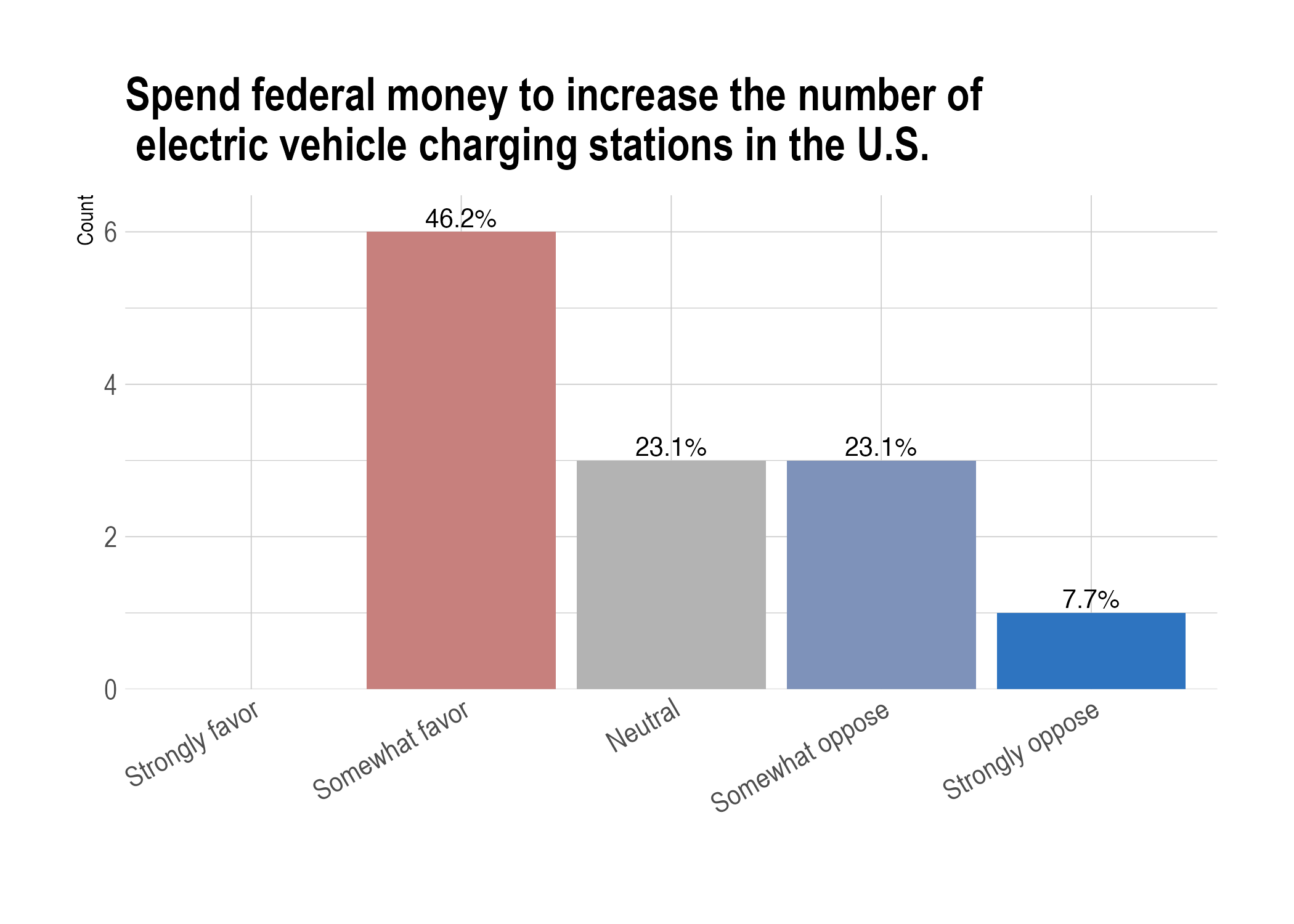
Economists: 68.95% favor
Our class is 31% less supportive than professional economists.
Policy Support: Border carbon adjustment (tax imports by GHG)
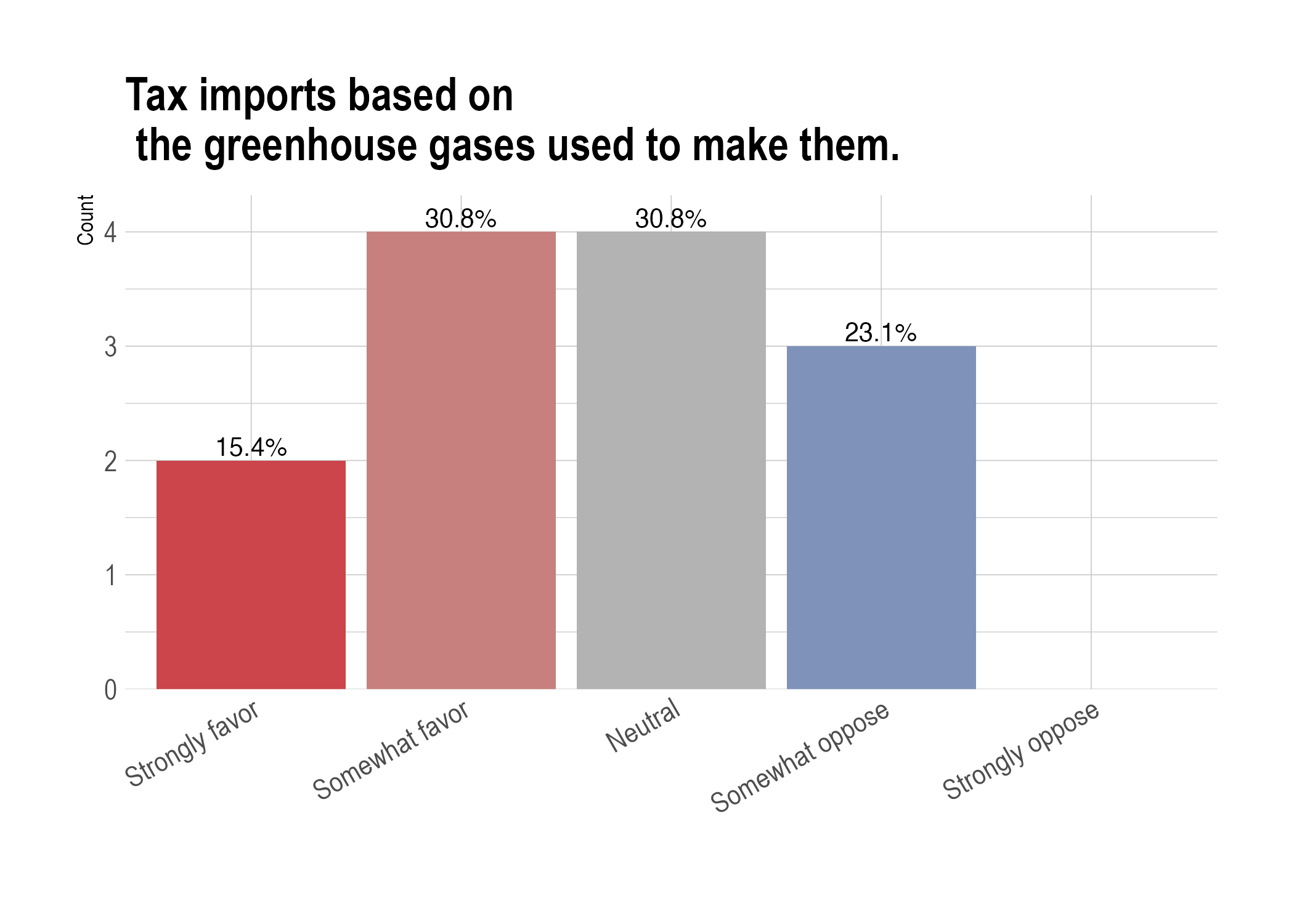
Economists: 67.72% favor
Our class is 24% less supportive than professional economists.
Policy Support: Higher fuel-efficiency standards
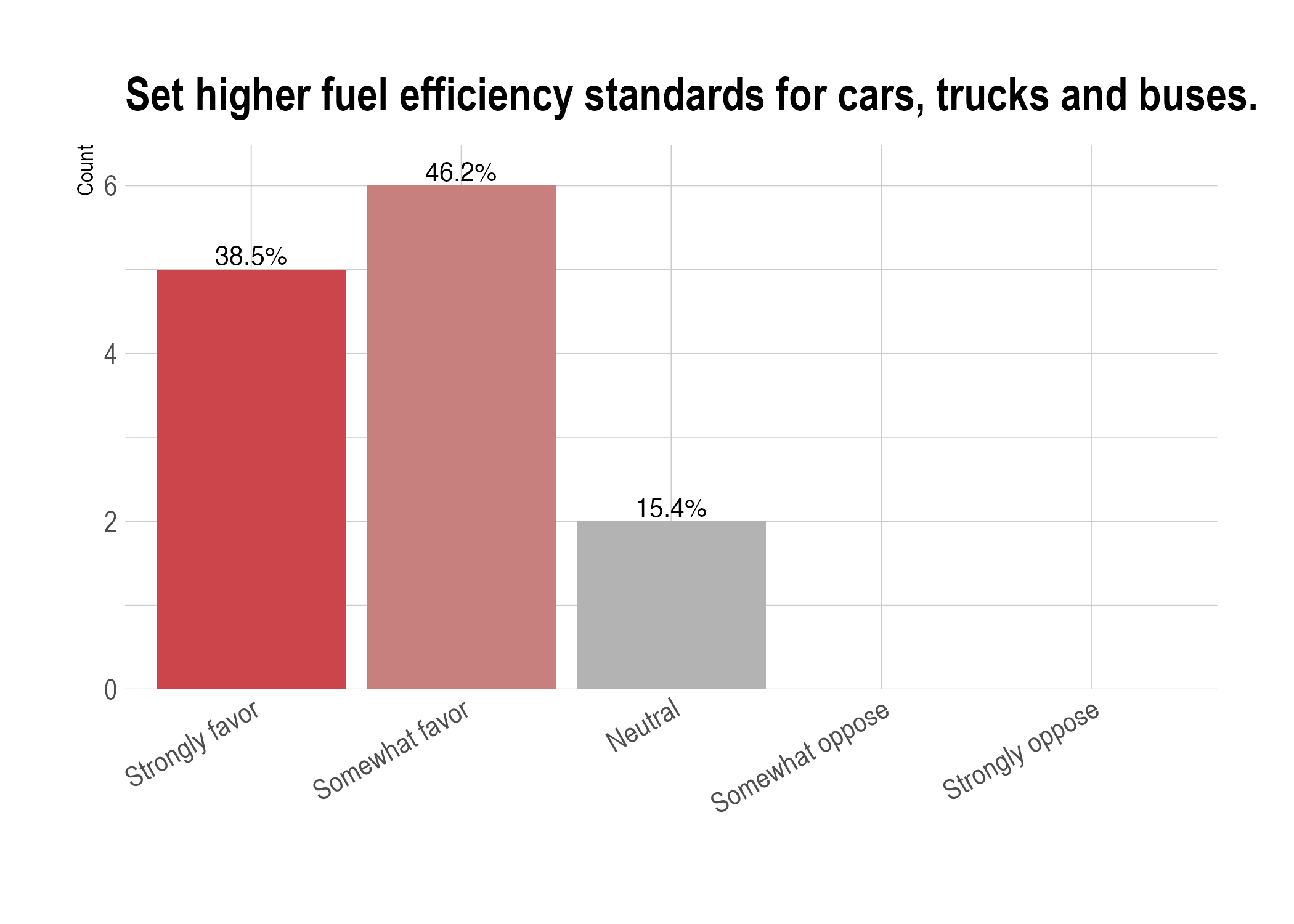
Economists: 66.84% favor
Our class is 15% more supportive than professional economists.
Policy Support: Business incentives for clean energy
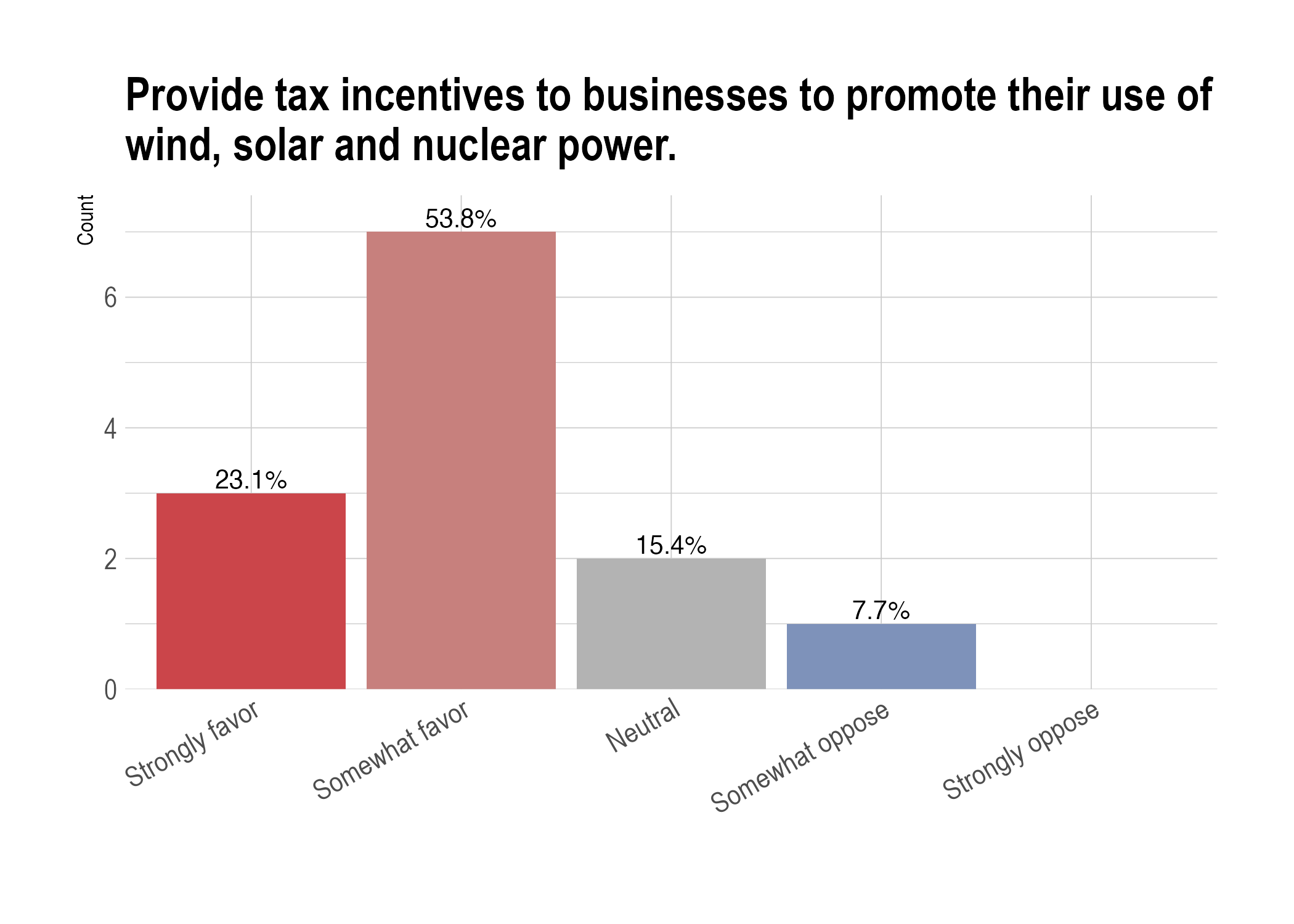
Economists: 63.35% favor
Our class is 18% more supportive than professional economists.
Policy Support: Home clean‑energy tax credits
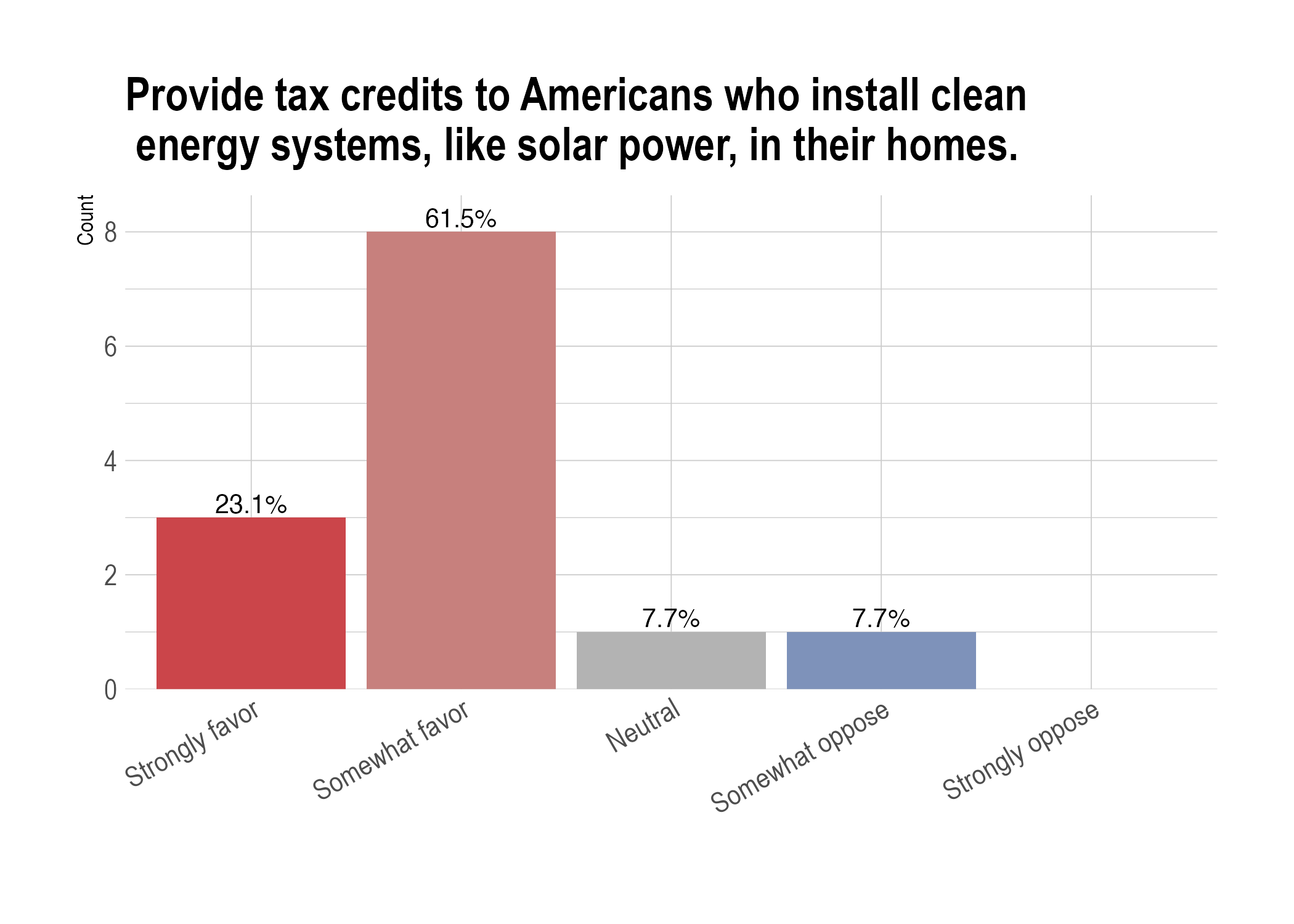
Economists: 61.26% favor
Our class is 20% more supportive than professional economists.
Policy Support: EV purchase tax credits
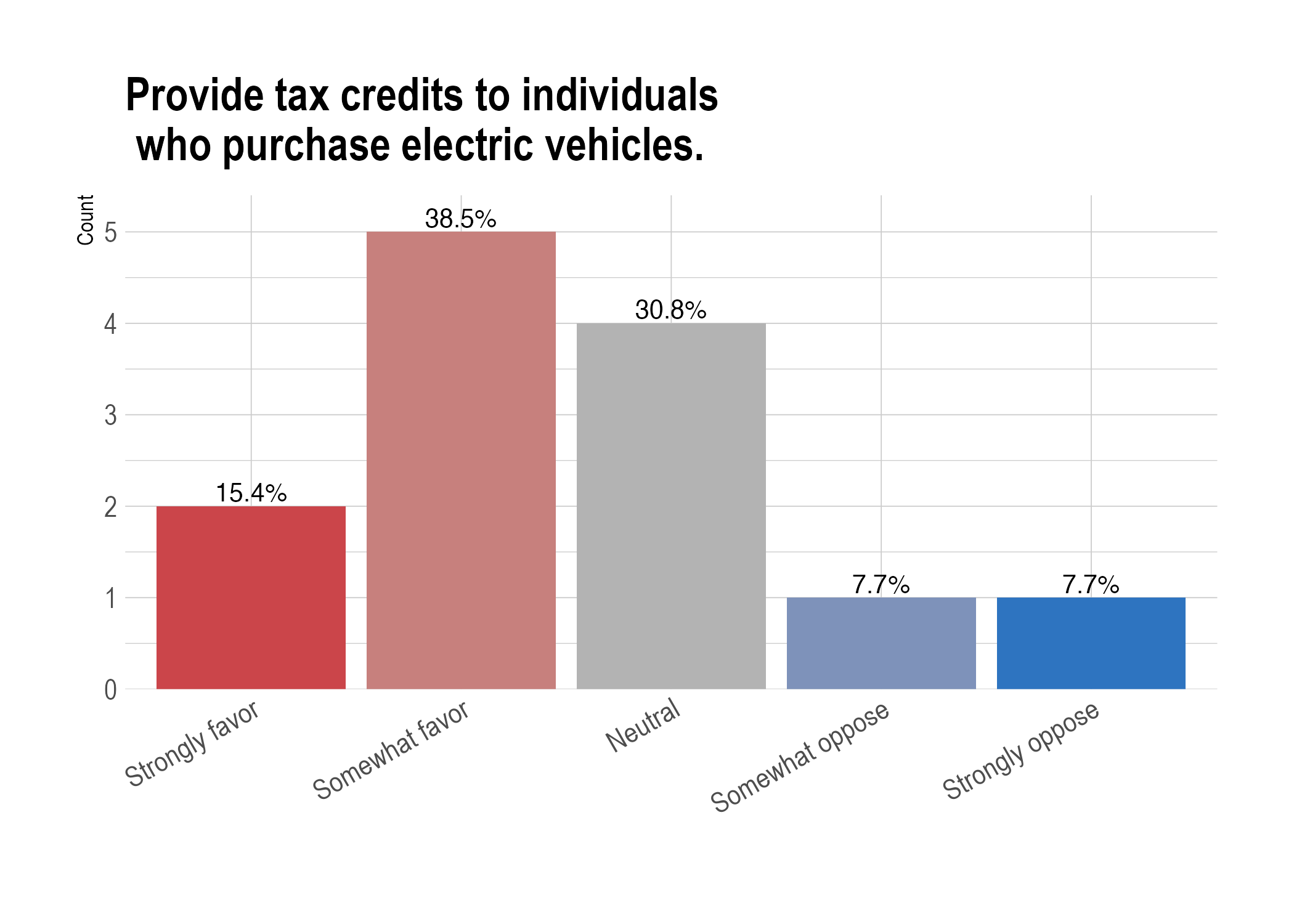
Economists: 51.85% favor
Our class is as supportive as professional economists.
Agree: EJ regulation should be implemented
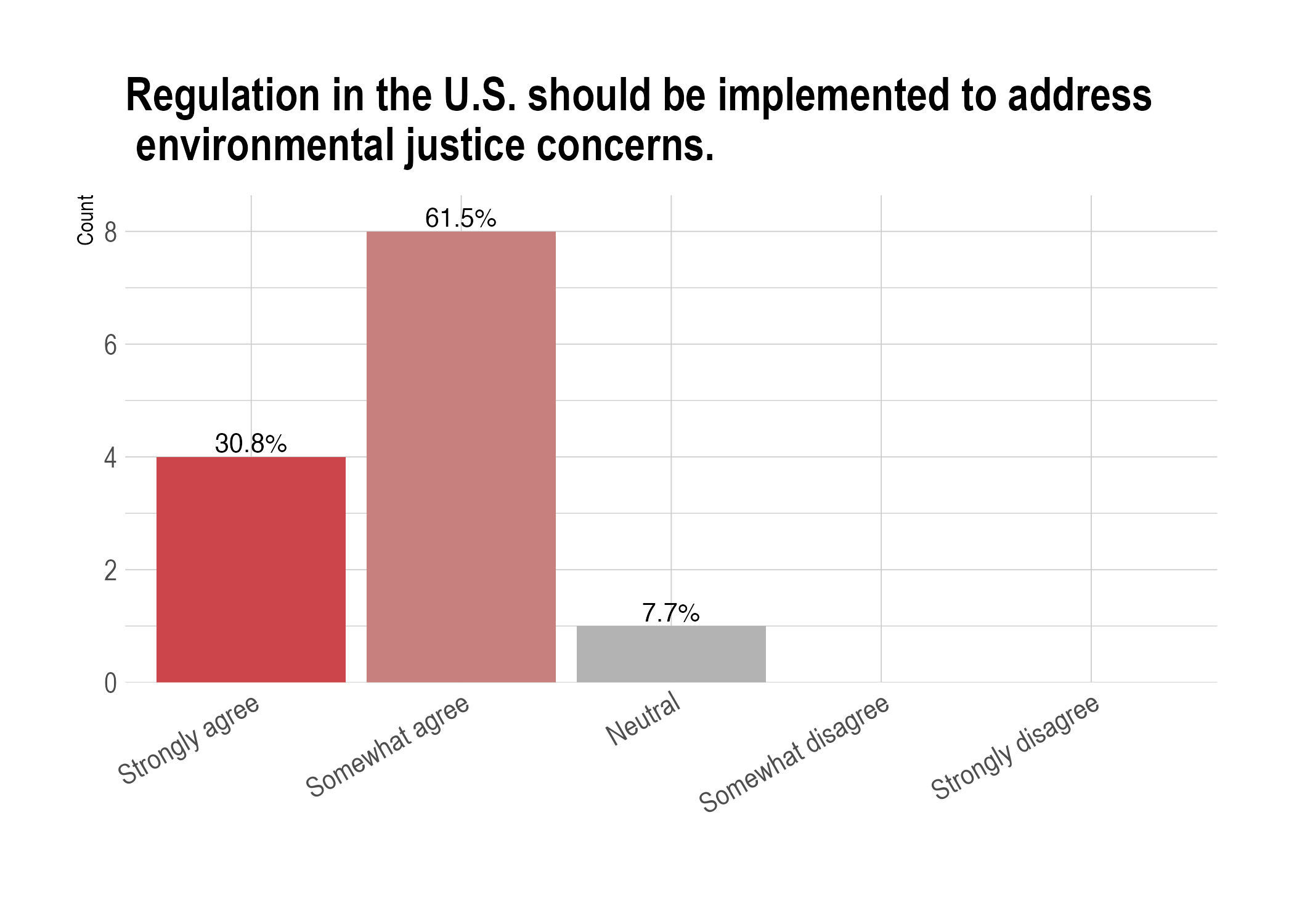
Economists: 81.15% agree
Our class is 6% more supportive than professional economists.
Agree: Reduce EPA regulatory power improves efficiency
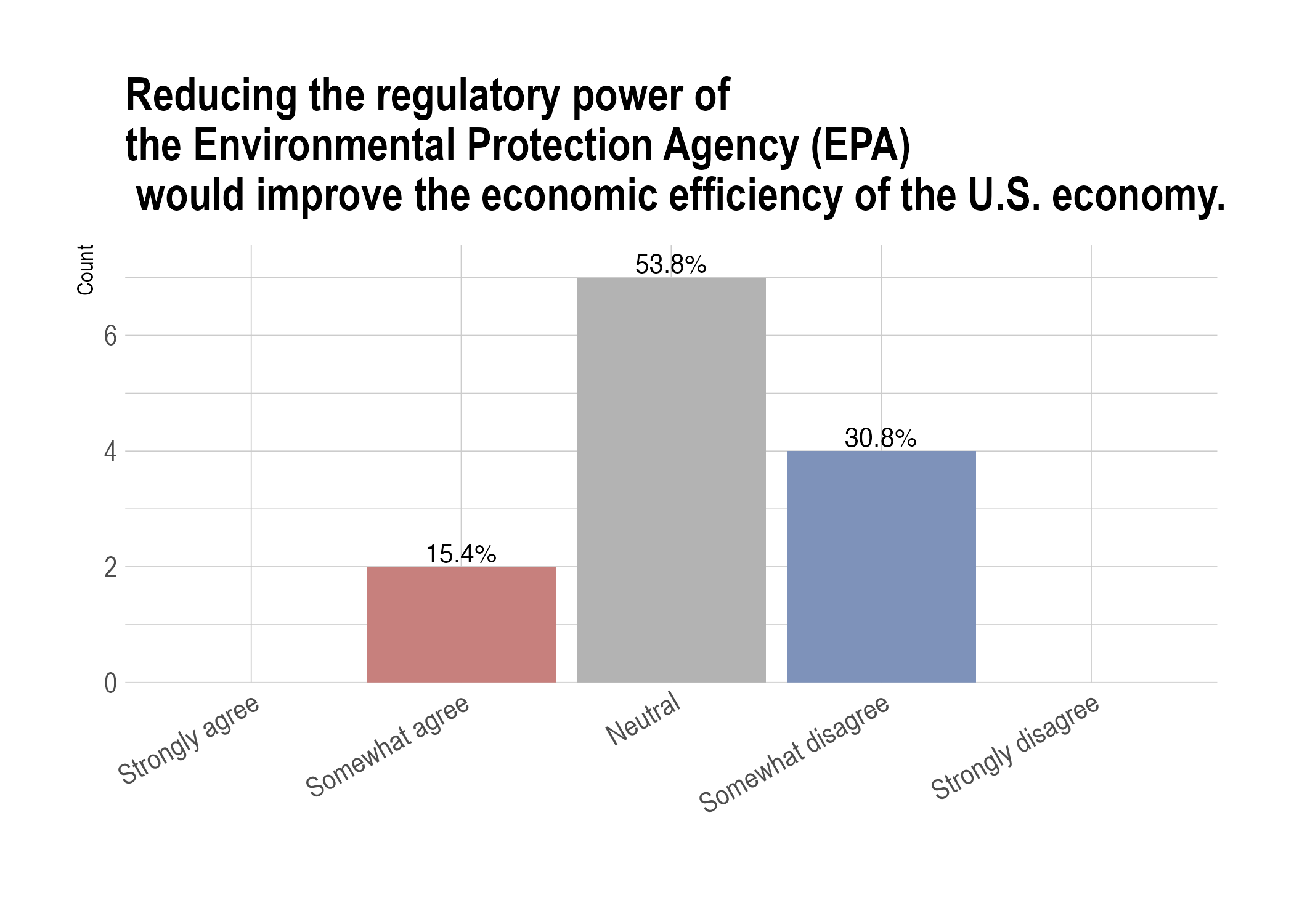
Economists: 80.63% disagree
Our class is 42% less disagreement than professional economists.
Agree: Communities near hazardous waste sites are aware/accepting
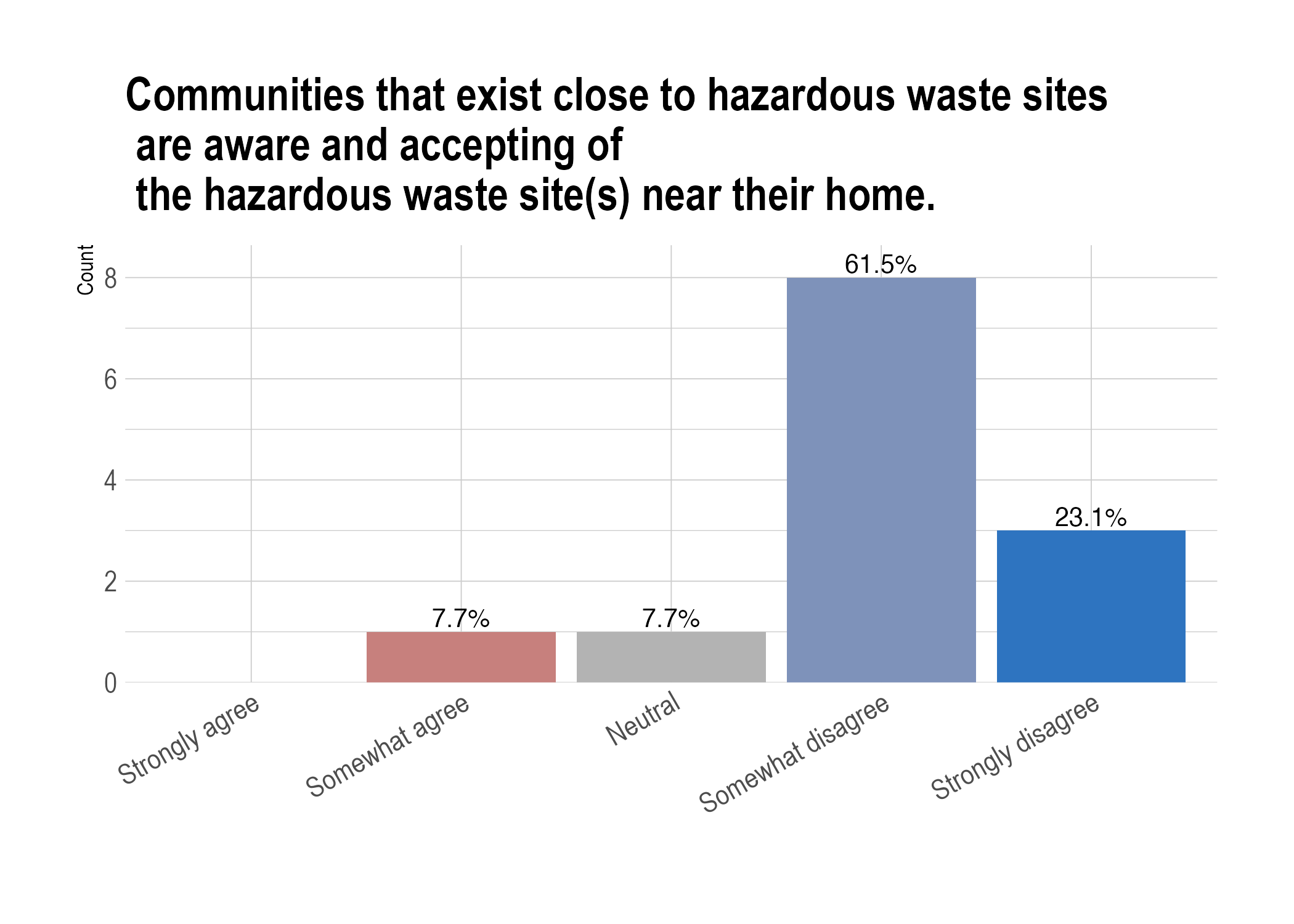
Economists: 75.39% disagree
Our class is 12% more supportive than professional economists.
Agree: Free market / property rights / tort law are best tools
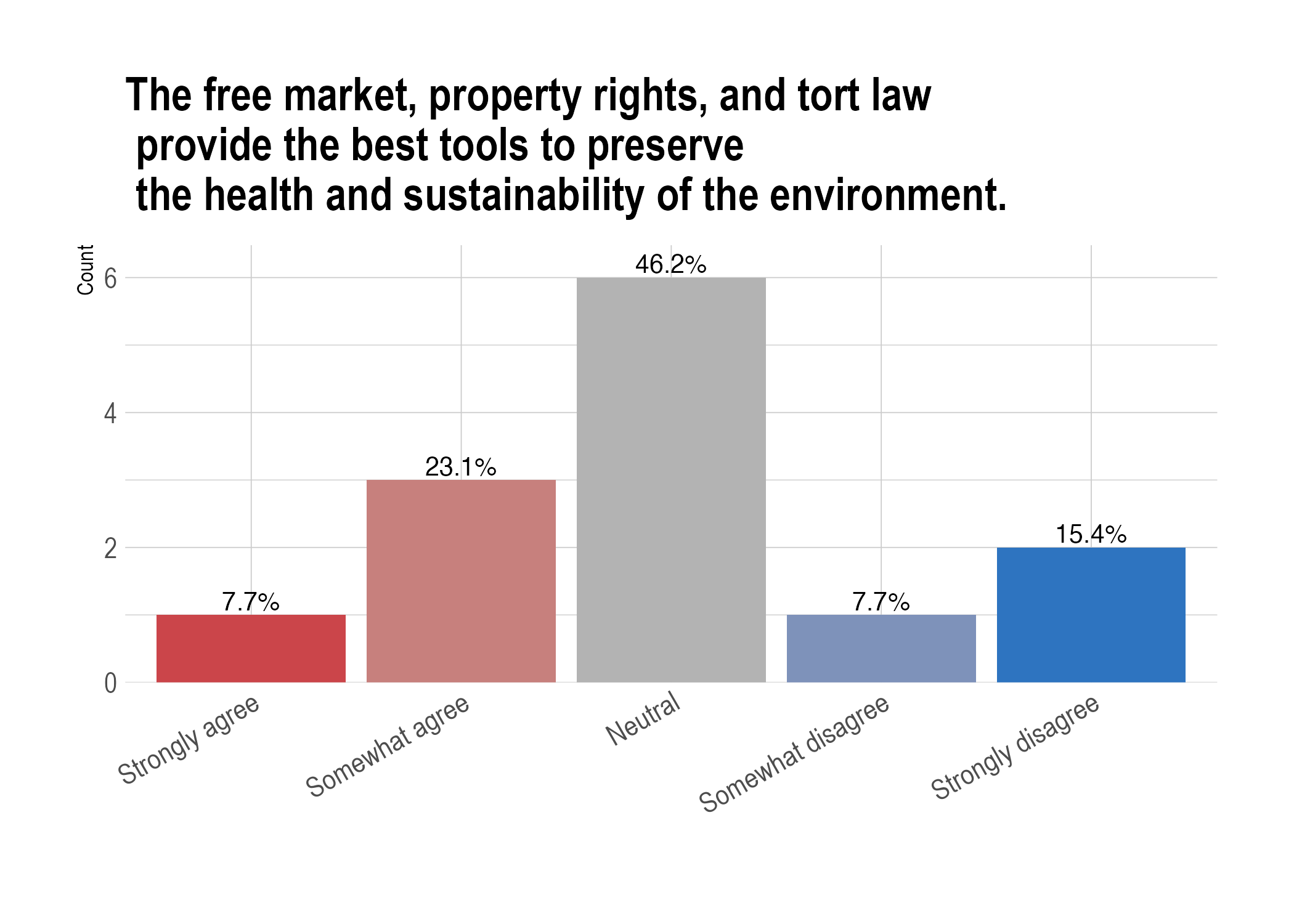
Economists: 73.44% disagree
Our class is 49% less disagreement than professional economists.
Agree: Economic growth always harms the environment
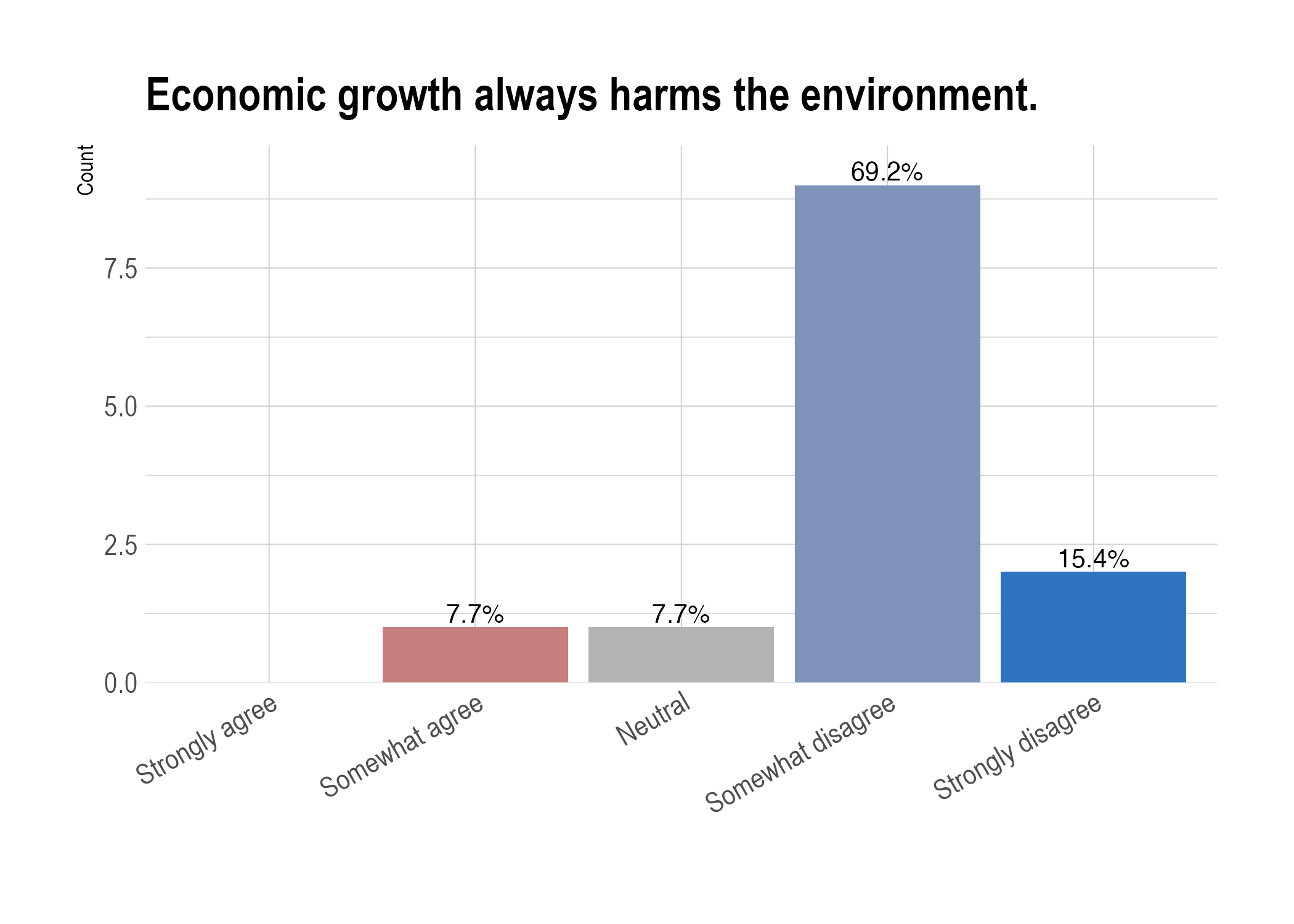
Economists: 70.16% disagree
Our class is 5% more disagreement than professional economists.
Agree: Carbon markets and offsets are efficient for firms
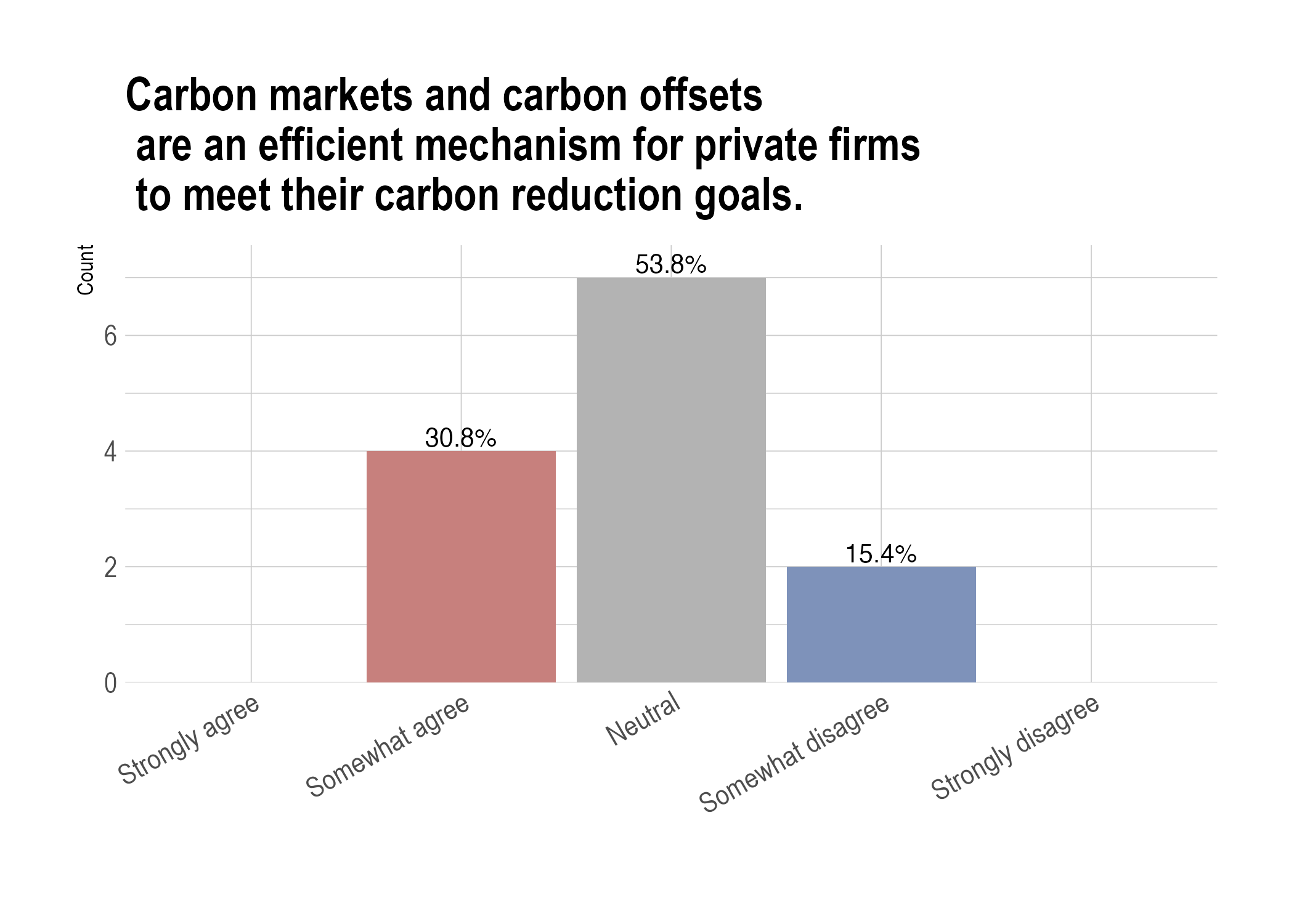
Economists: 56.84% agree
Our class is 26% less supportive than professional economists.
Agree: Return carbon revenues via dividends / lower taxes
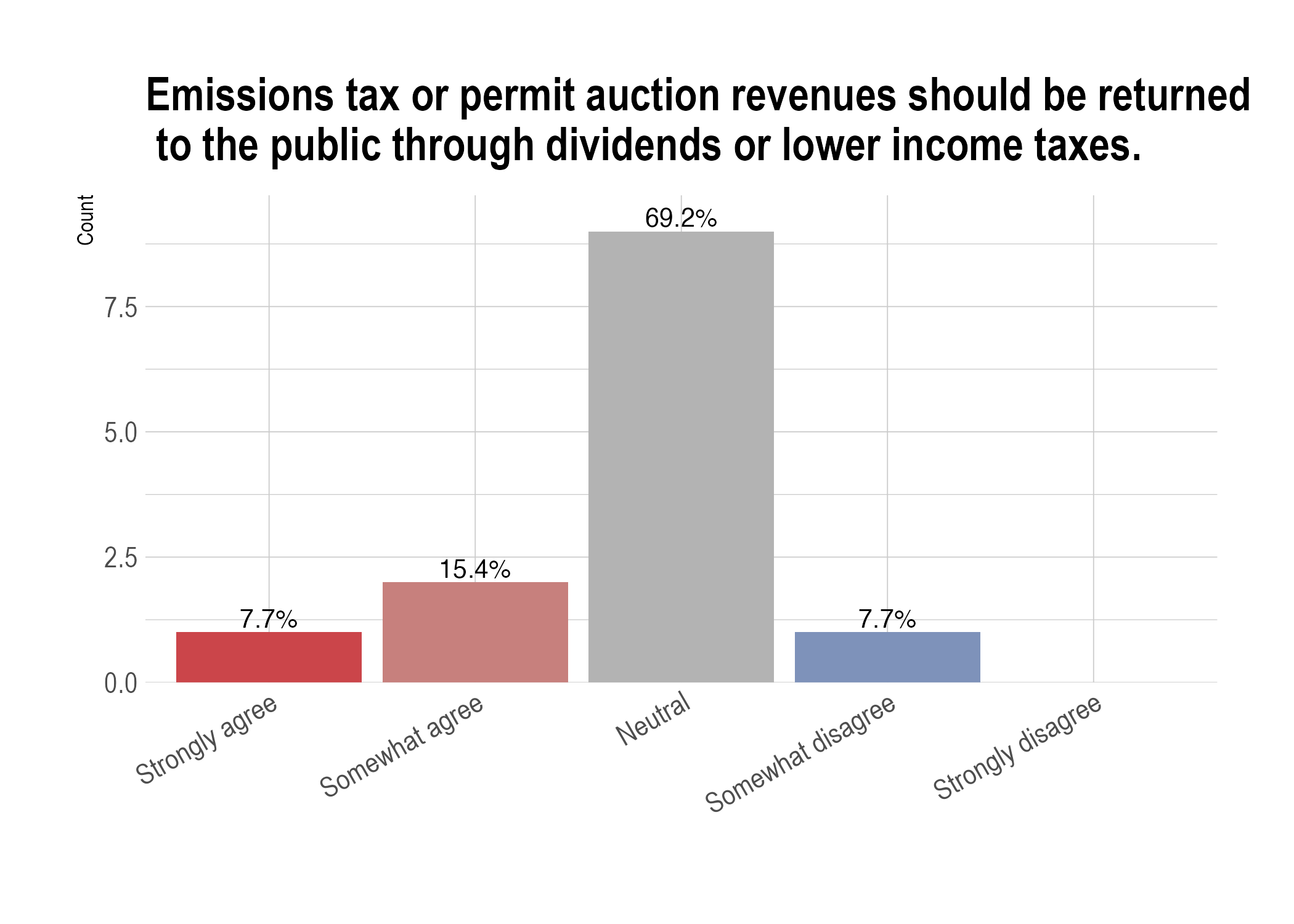
Economists: 55.5% agree
Our class is 32% less supportive than professional economists.
Agree: Use carbon revenues to reduce national debt
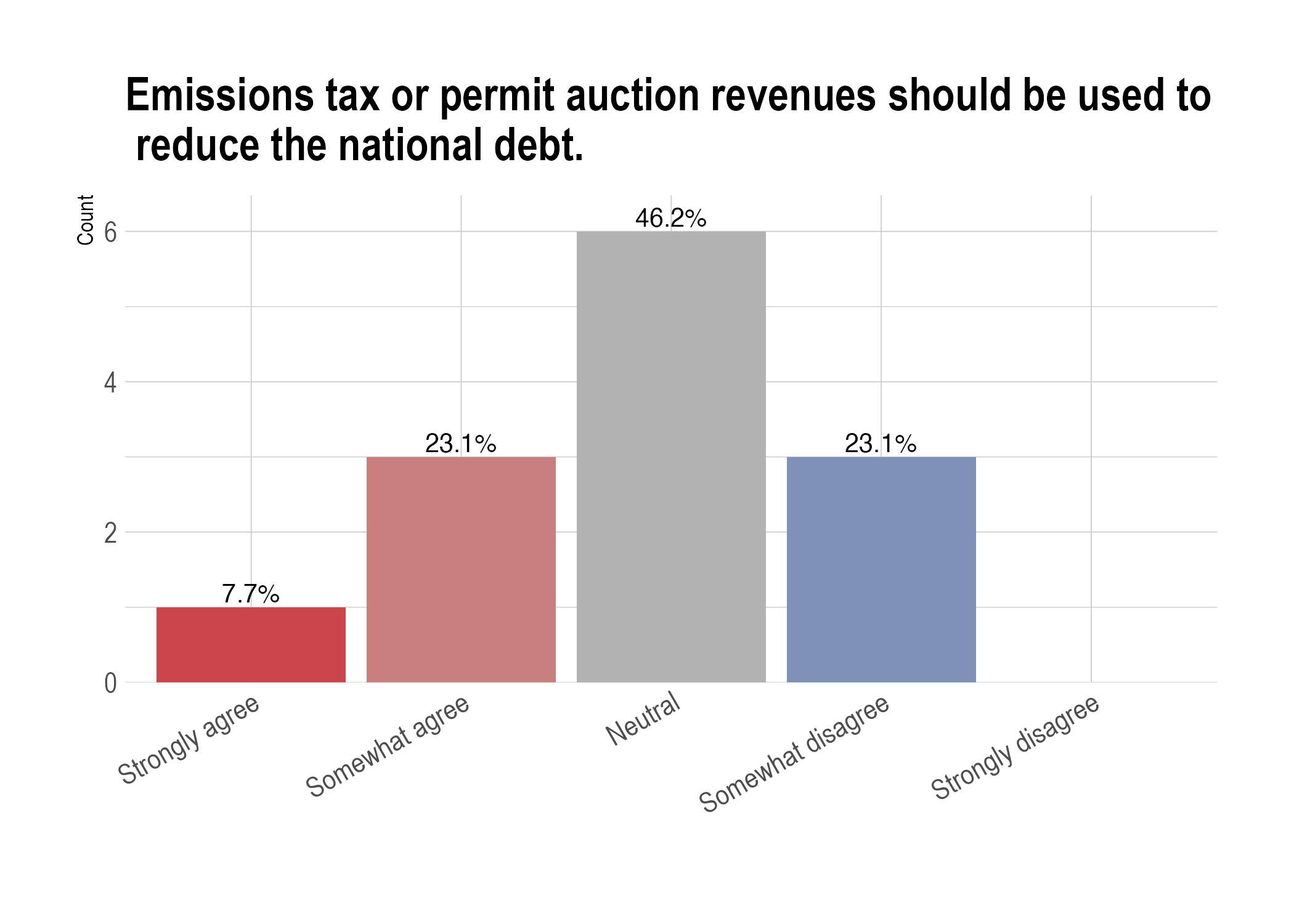
Economists: 42.63% neutral
Our class is 5% less neutral than professional economists.
Agree: Emission standards are rigid / insensitive to differences
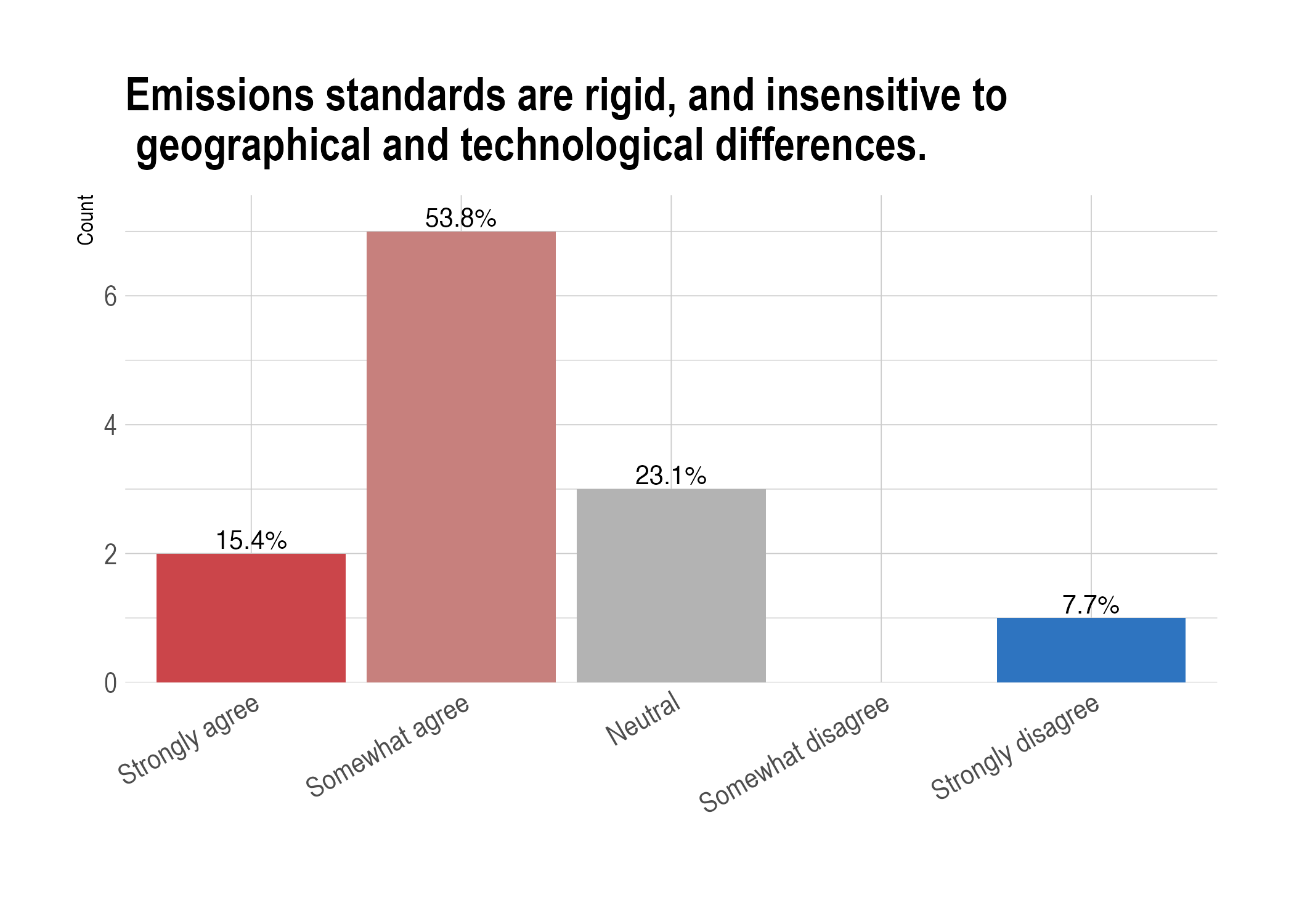
Economists: 49.74% agree
Our class is 13% more supportive than professional economists.
Agree: Max sustainable level of economic growth exists
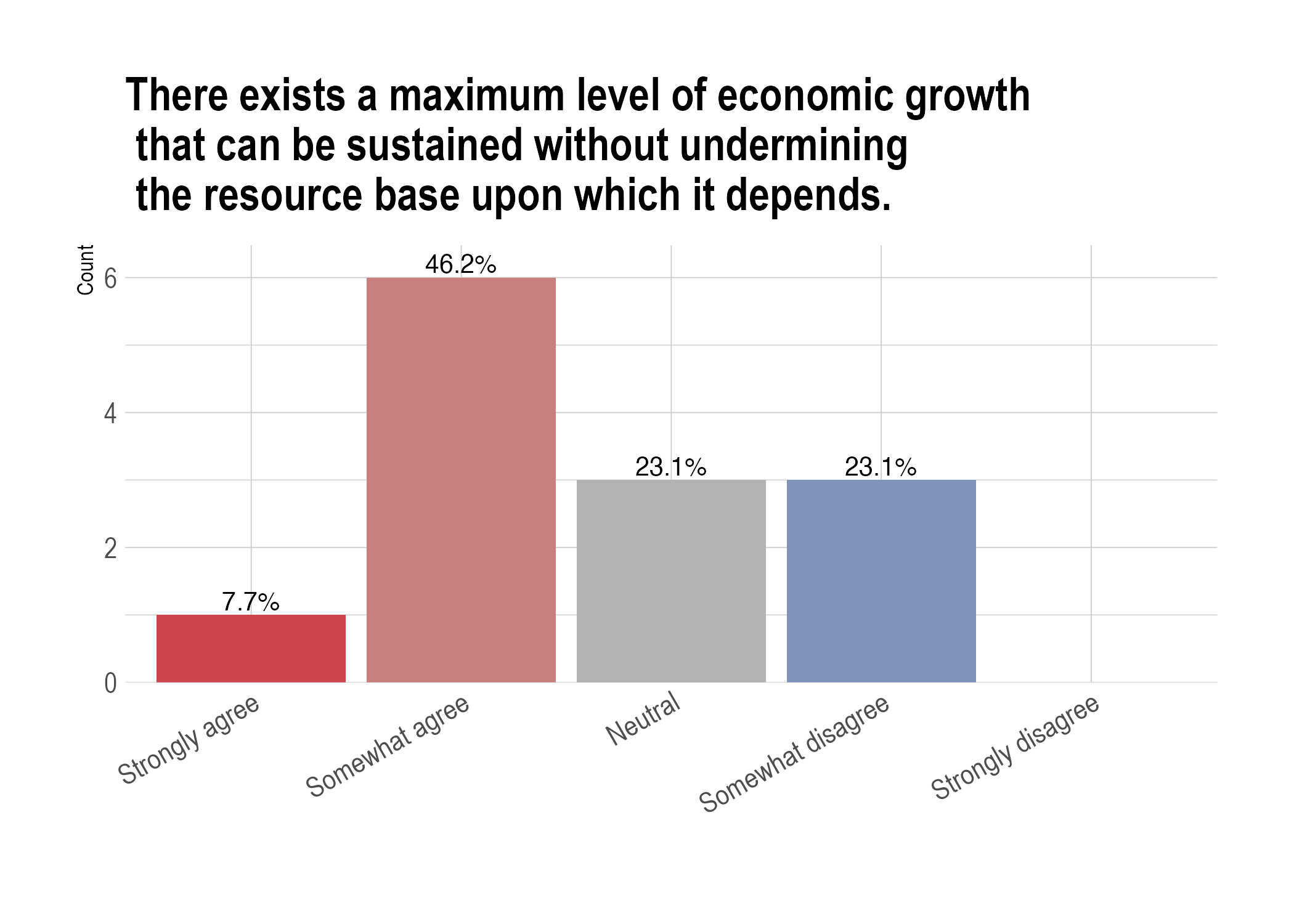
Economists: 44.21% agree
Our class is 12% more supportive than professional economists.
Agree: Population growth degrades the environment
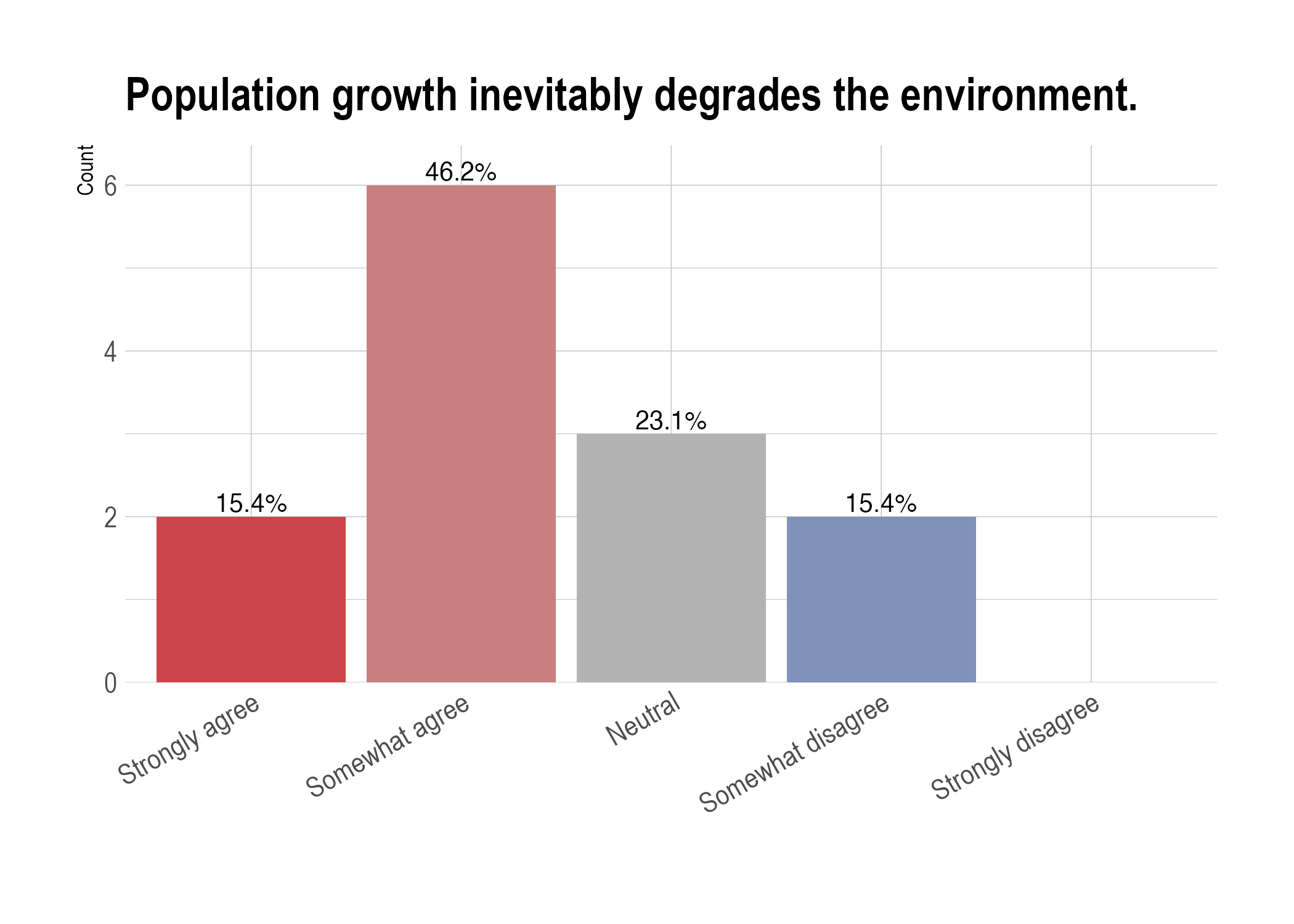
Economists: 41.58% disagree
Our class is 24% less disagreement than professional economists.
Professional Consensus
Professional consensus — highlights
Supermajority and High Levels of Strong Consensus (1/2)
- Unregulated markets provide public goods in optimal quantities. (96.84% disagree)
- Air pollution and hazardous waste siting decisions disproportionately affect low-income & minority communities. (91.05 / 90.53% agree)
- Emissions taxes or marketable emissions permits are a more economically efficient approach to pollution control than emissions standards. (90.5% agree)
- How concerned are you about climate change? (88.95% concerned)
- Unregulated common-pool resources face the “tragedy of the commons” problem. (87.96% agree)
- The U.S. should increase energy taxes. (83.33% agree)
Professional consensus — highlights
Supermajority and High Levels of Strong Consensus (2/2)
- Reducing the regulatory power of the Environmental Protection Agency (EPA) would improve the economic efficiency of the U.S. economy. (80.63% disagree)
- Communities that exist close to hazardous waste sites are aware and accepting of the hazardous waste site(s) near their home. (75.39% disagree)
- For environmental problems, there should be international agreements that U.S. and other countries should be made to follow. (74.35% agree)
- The free market, property rights, and tort law provide the best tools to preserve the health and sustainability of the environment. (73.44% disagree)
- Economic growth always harms the environment. (70.16% disagree)
- Tax imports based on the GHGs used to make them. (67.72% favor)
Professional consensus — highlights
Without a Supermajority but With a Majority (>50%)
- Provide tax credits to Americans who install clean energy systems, like solar power, in their homes. (61.26% favor)
- How concerned are you about air quality? (57.14% concerned)
- Carbon markets and carbon offsets are an efficient mechanism for private firms to meet their carbon reduction goals. (56.84% agree)
- Emissions tax or permit auction revenues should be returned to the public through dividends or lower income taxes. (55.50% agree)
- How concerned are you about environmental justice? (53.97% concerned)
- Provide tax credits to individuals who purchase electric vehicles. (51.85% favor)
Professional consensus — highlights
Without a Majority of Without Agreement/Disagreement
- Emissions standards are rigid, and insensitive to geographical and technological differences. (49.74% agree)
- How concerned are you about renewable energy? (45.21% concerned)
- There exists a maximum level of economic growth that can be sustained without undermining the resource base upon which it depends. (44.21% agree)
- How concerned are you about mining impacts? (40.64% concerned)
- How concerned are you about solid waste? (39.46% unconcerned)
- How concerned are you about hazardous waste? (38.38% neutral)
Professional consensus — highlights
- The respondents in the 2023 survey were:
- 70% male
- 81% white
- 90% Ph.D. educated
- 77% politically liberal.
- Economists broadly favor market-based instruments (taxes/permits) for cost-effective abatement
- Strong support for EV infrastructure and fuel economy standards
- Recognition of environmental justice concerns and the role of regulation
- Mixed preferences on revenue recycling (dividends vs. deficit reduction)
- Skepticism about free-market environmentalism as a sole approach
Class Survey Results vs. Professional Consensus
Q1: Renewable Energy
How concerned are you about renewable energy?
- Class: 80% concerned
- Economists: 45% concerned
- Why the gap?
- Economists: cautious — focus on system-wide efficiency, trade-offs, and carbon pricing
- Different interpretation: “concern” = not enough being done vs. priority among many issues
- Economists: cautious — focus on system-wide efficiency, trade-offs, and carbon pricing
Q2: Solid Waste
How concerned are you about solid waste?
- Class: 76% concerned
- Economists: 39% unconcerned
- Why the gap?
- Economists: see waste as less critical compared to climate/energy externalities
- Landfills & recycling markets: often solvable locally, smaller macroeconomic impact
- Economists: see waste as less critical compared to climate/energy externalities
Q3: EPA Regulation
Reducing the regulatory power of the Environmental Protection Agency (EPA) would improve the economic efficiency of the U.S. economy.
- Economists: Many skeptical of this statement
- Class: More mixed responses
- Why the gap?
- Economists see EPA as correcting market failures (externalities) → regulations can increase efficiency
- Without regulation, pollution costs shift to society rather than polluters
- Economists see EPA as correcting market failures (externalities) → regulations can increase efficiency
Q4. Free Market, Property Rights, and Tort Law
The free market, property rights, and tort law provide the best tools to preserve the health and sustainability of the environment.
- Economists: 73% disagree
- Class: Only 24% disagree
- Why the gap?
- Economists: global problems like CO₂ are commons problems → markets & tort law can’t solve them alone
- Need collective tools: carbon pricing, cap-and-trade, regulations
- Economists: global problems like CO₂ are commons problems → markets & tort law can’t solve them alone